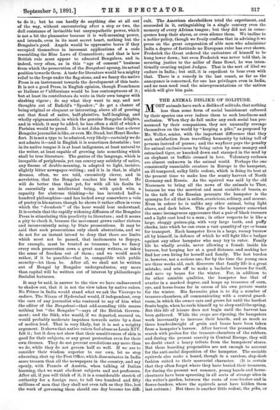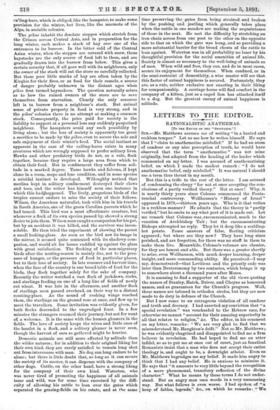THE ANIMAL DISLIKE OF SOLITUDE.
MOST animals have such a dislikeof solitude, that nothing less than some form of social banishment enforced by their species can ever induce them to seek loneliness and seclusion. When they do fall under any such social ban pro- nounced by their companions, they not unusually revenge themselves on the world by "keeping a pike," as proposed by Mr. Weller, senior, with the important difference that they seek satisfaction from travelling humanity by taking toll of persons instead of purses ; and the wayfarer pays the penalty for animal exclusiveness by being eaten by some mangey and ostracised tiger, or knocked down and stamped in the mud by an elephant or buffalo crossed in love. Voluntary recluses are almost unknown in the animal world. Perhaps the one • consistently unsociable creature in Europe is the hampster, an ill-tempered, sulky little rodent, which is doing its best at the present time to make less the scanty harvest of North Germany and Russia. As the squirrel was said by the old Norsemen to bring all the news of the animals to Thor, because he was the merriest and most sociable of beasts, so in the talk of the Russian peasants the hampster is the synonym for all that is sullen, avaricious, solitary, and morose. Even in colour he is unlike any other animal, being light above, and dark below. This gives the hampster somewhat the same incongruous appearance that a pair of black trousers and a light coat lend to a man ; in other respects he is like a large, shaggy guinea-pig, with very large teeth, and puffy cheeks, into which he can cram a vast quantity of rye or beans for transport. Each hampster lives in a large, roomy burrow all by himself, in defence of which he will fight like a badger against any other hampster who may try to enter. Family life he wholly avoids, never allowing a female inside his burrow, but keeping her at a good distance, and making her find her own living for herself and family. The last burden is, however, not a serious one, for by the time the young ones are three weeks old, each discovers that family life is a great mistake, and sets off to make a bachelor burrow for itself, and save up beans for the winter. For, in addition to its other amiable qualities, the hampster has that of avarice in a marked degree, and heaps up treasures of corn, rye, and horse-beans far in excess of his own private wants for the winter. His favourite plan is to dig a number of treasure-chambers, all communicating with a central guard- room, in which the owner eats and grows fat until the hardest frosts begin, when he curls himself up to sleep until the spring. But this life of leisure does not begin until the harvest has been gathered. While the crops are ripening, the hampsters work incessantly to increase their hoards, and as much as three hundredweight of grain and beans have been taken from a hampster's burrow. After harvest the peasants often search with probes for the treasure-chambers of the robbers, and during the present scarcity in Central Europe, they will no doubt exact a heavy tribute from the hampsters' stores. But these hoarding propensities are not enough to account for the anti-social disposition of the hampster. The sociable squirrels also make a hoard, though in a careless, slap-dash fashion suited to their mercurial character. (It is certain that they often forget where they have buried their treasures, for daring the present wet summer, young hazels and horse- chestnuts have been sprouting in all sorts of strange sites in the writer's garden, between the roots of rose-bushes and in flower-borders, where the squirrels must have hidden them last autumn.) But there is another little rodent, the pika, or
calling-hare, which is obliged, like the hampster, to make some provision for the winter, but lives, like the marmots of the Alps, in sociable colonies.
The pikas inhabit the desolate steppes which stretch from the Crimea across Central Asia, and in preparation for the long winter, each makes a stack of hay over one of the entrances to its burrow. In the bitter cold of the Central Asian winter, when the steppes are covered with snow, these haystacks are the only source of food left to them, and are gradually drawn into the burrow from below. This gives a certain security that, if all goes well with its neighbours, only the owner of the stack will eat the store so carefully collected. But these poor little stacks of hay are often taken by the Kirghiz for their fires, or as food for their camels, a source of danger probably unknown in the distant ages when pikas first turned haymakers. The question naturally arises as to how the ruined owners of the store are to save themselves from starvation. Clearly the only resource left is to burrow from a neighbour's stack. But animal sense of private property in food is very strong, and in the pikas' colonies there is no attempt at making a common stock. Consequently, the price paid for society is the liability to support at a personal loss any suddenly pauperised neighbour. The bampsters avoid any such possibility by living alone ; but the loss of society is apparently too great a sacrifice to be made by the pikas, even to secure the sole and safe enjoyment of their winter's food. The social instinct so apparent in the case of the calling-hares exists in many creatures which are wrongly supposed to prefer solitary lives. Hawks and other predatory birds do not,. as a rule, flock . together, because they require a large area from which to obtain their food. But in confinement they suffer from soli- tude in a marked degree. Tame hawks and falcons, if kept alone in a room, mope and lose condition, and in some species a suicidal instinct is developed. Willoughby noticed that merlins kept in solitary confinement destroyed their claws and toes, and the writer has himself seen one instance in which this hadjhappened. The lively, gregarious birds of the tropics cannot endure to miss the society of their fellows. Wilson, the American naturalist, took with him in his travels in South America, one of the green Carolina parrots which he had tamed. This bird was a most affectionate creature, but whenever a flock of its own species passed by, showed a strong desire to join them. Wilson soon caught a companion for his pet, but by an accident it was killed, and the survivor was incon- solable. He then tried the experiment of showing the parrot a small looking-glass. As soon as the bird saw its image in the mirror, it seemed quite contented with its shadowy com- panion, and would sit for hours cuddled up against the glass with great satisfaction. The flocking of the non-migratory birds after the nesting-season is mainly due, not to the pres- sure of hunger, or the pressure of food in particular places, but to their love of society. In late summer and harvest time, when the face of the country is one broad table of food for the birds, they flock together solely for the sake of company. Recently the writer watched a vast flock of jackdaws, rooks, and starlings feeding on one of a long line of fields of newly cut wheat. It was late in the afternoon, and another flock of starlings soon passed overhead, on their way to a distant roosting-place. As the sound of rushing wings reached them, the starlings on the ground rose at once, and flew up to meet the travellers. Some invitation was evidently given, for both flocks descended to the ungrudged feast. In a few minutes the strangers resumed their journey, but not for want of a welcome. It is the same with the human gleaners.in the fields. The love of society keeps the wives and little ones of the hamlet in a flock, and a solitary gleaner is never seen, though the harvest of ears so gathered might be heavier.
Domestic animals are still more affected by solitude than the wilder natures ; for in addition to their original liking for their own kind, they are rarely satisfied to remain long shut out from intercourse with man. No dog can long endure to be alone; but there is little doubt that, so long as it can secure the society of its master, it can dispense with the company of other dogs. Cattle, on the other hand, have a strong liking for the company of their own kind. Waterton, who was never tired of promoting the happiness of all animals tame and wild, was for some time exercised by the diffi- culty of allowing his cattle to lean over the gates which separated the grazing-fields on his estate, and at the same
time preserving. the gates from being strained and broken by the pushing and jostling which generally takes place when the cattle in one meadow are making the acquaintance of those in the next. He met the difficulty by stretching an iron chain across from one post to the other on the opposite side to that on which the gate was hung, and so providing a more substantial barrier for the broad chests of the cattle to lean against. Waterton was in all probability no loser by his thoughtful provision for the social amenities of animal life- Society is almost as necessary to the well-being of animals as of men. When wild and free, they can, and do in most cases, secure its enjoyment for themselves. When confined, or in the semi-restraint of domesticity, a wise master will see that- this factor of animal happiness is secured. Fortunately, they are, as a rule, neither exclusive nor exacting in their liking for companionship. A carriage-horse will find comfort in the company of a kitten, just as a caged lion has attached itself to a dog. But the greatest enemy of animal happiness is solitude.



































 Previous page
Previous page